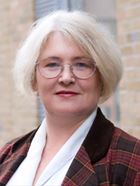
Full Name: Jo Strange
Job Title: Technical Director
Company: Card Geotechnics Limited (CGL)
I am a chartered civil engineer and environmentalist with over thirty years of experience. I’ve worked for multi-disciplinary consultancies before joining specialist geotechnical and geo-environmental consultancy, CGL. I am responsible for delivery of mostly brownfield projects involving due diligence, audits, planning, management, design, specification, implementation and interpretation of site investigations, risk assessments and remediation. I occasionally take on Expert Witness projects also. I manage SHEQ across the company and supervise technical staff towards Chartership with the ICE and IES. I am a STEM ambassador and involved with the ICE as a Reviewer, on Standards Panel and author of their guidance on Contaminated Land.
Away from work, my passion is my horses, especially side saddle riding and Cleveland Bays.
What or who inspired you to join the geotechnical industry?
It happened a bit by accident. My MEng was in civil and environmental engineering from Liverpool University, when environmental engineering was still in its infancy. I joined Mouchel as a graduate and was duly dispatched to ‘the Grotto’ where the geotechnical team were based. At the time David Jones was developing contaminated land capabilities and I got involved through him on projects like Thurrock MSA. After a couple of years rotation around the various departments, designing shopping centres, (The Wellington Centre in Aldershot and The Peacocks in Woking all have a bit of me in them!), post tensioned bridges, grain conveyors, David invited me back to work on contaminated land projects and as they say…. the rest is history.
What does a typical day entail?
There isn’t really a typical day, as every day is different, with the numerous projects on the go at any one time and my various management roles. The day always starts with checking emails for what might have happened that requires an urgent response. Next, there will be project reports to write, check or review; technical queries to respond to, proposals to write, discussions with Clients, contractors, CGL project managers and engineers; internal / external or site meetings, planning of training and compliance audits and actions… and not forgetting finding time to catch up with the great bunch of people who work at CGL!
Are there any projects which you’re particularly proud to have been a part of?
All of then really, as I hope I give all my projects 100% to get the best answer, but if I have to pick, it would be the Blue Print industrial Estate in Portsmouth. This was an early project with BG Properties Gasworks. More recently, the ground investigation at the old New Scotland Yard which had some serious logistical challenges and currently the remediation of Royal Wharf with Ballymore which has transformed for the better that stretch of waterfront.
What are the most challenging aspects of your role?
Juggling time and energy to support staff and projects on the technical side whilst developing new works and delivering quality results and advice. Keeping a life/work balance is important.
What AGS Working Group(s) are you a Member of and what are your current focuses?
Loss Prevention Working Group; there are lots of things on the go, from looking at the impacts of contract clauses, poor wording in reports, disputes and events and trying to use a crystal ball to see what commercial issues may be arising in future.
What do you enjoy most about being an AGS Member?
Being part of a group and network of intelligent interesting professional people who are passionate enough about what they do to want to share their experience. It is also a great forum to exchange ideas and thoughts.
What do you find beneficial about being an AGS Member?
Following on from the previous answer, the library of information and guidance is amazing and it is easy to forget how comprehensive and accessible it is. Although, I haven’t used them very much, knowing that the ‘helplines’ are there and the knowledge/ experience of the people behind them, is re-assuring.
Why do you feel the AGS is important to the industry?
The industry has such a variety of skills and technologies that the AGS provides a central ‘hub’ and place of reference, where ideas, latest thinking and best practice can be collated and disseminated and provides a single point of contact enabling the ground engineering industry to present a coherent and consistent face to the construction and land management sectors.
What changes would you like to see implemented in the geotechnical industry?
Recognition of the value and importance of what ground engineering, (be it geotechnical or geoenvironmental), brings to construction projects. We so often see that the lowest price is the deciding factor, when high quality data and advice is what is needed to get the right and most economic answer first time.
John Burland was so right when he said you would pay for a ground investigation whether you have one or not, but the flexibility and benefits of having quality up front information, with some exceptions, doesn’t seem to be a message that gets much further than the ground engineering specialists.